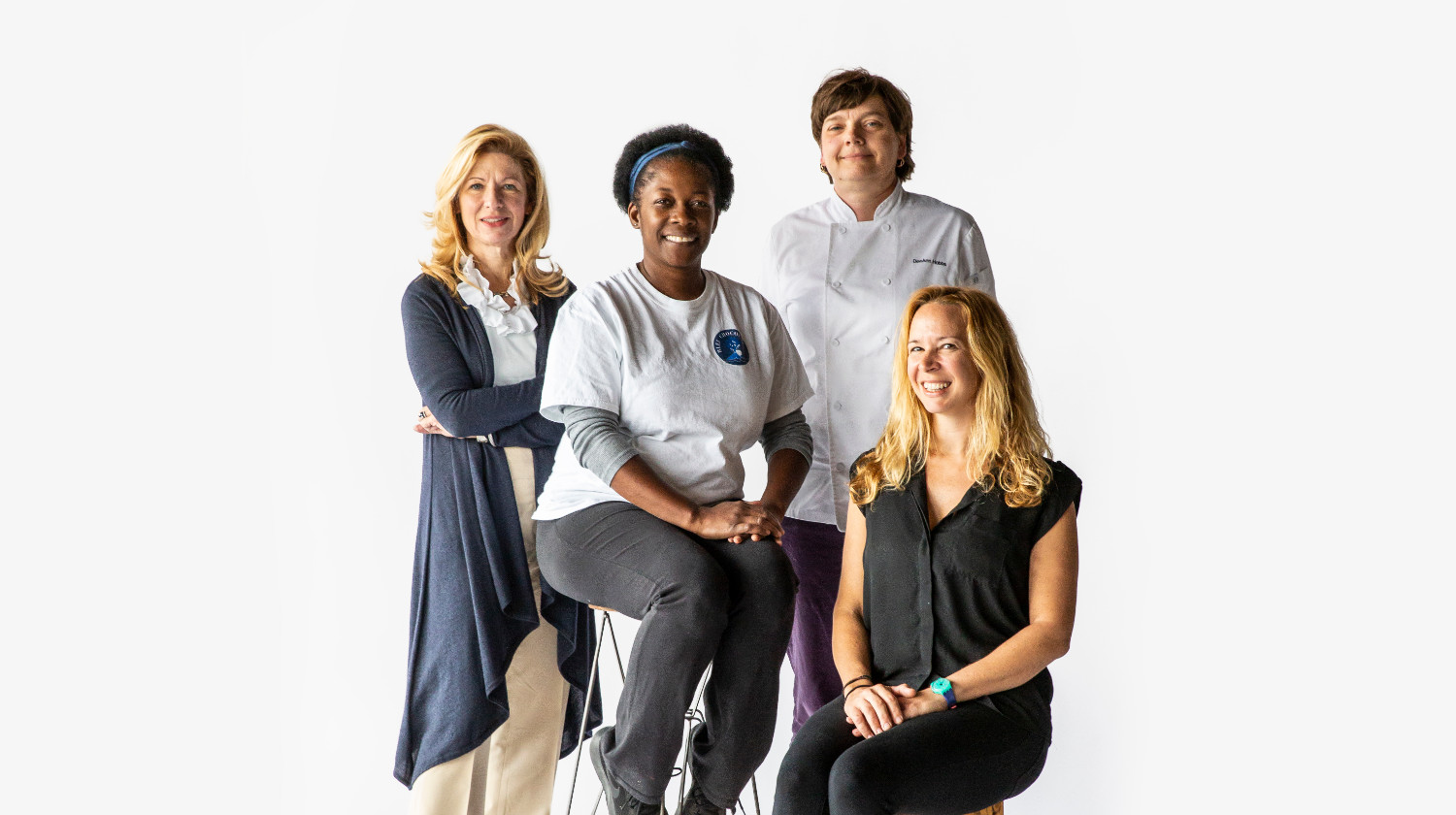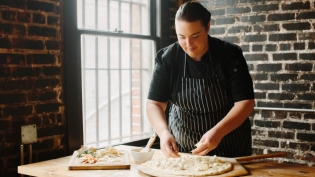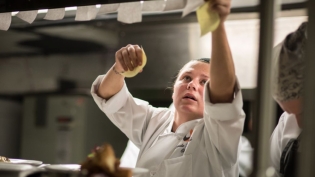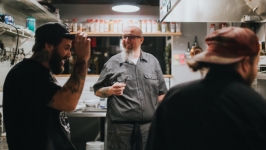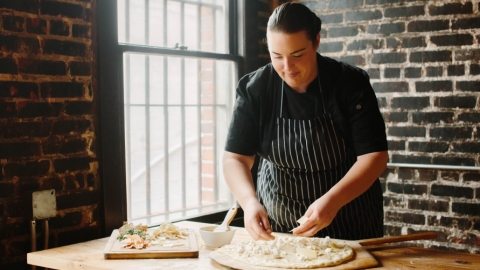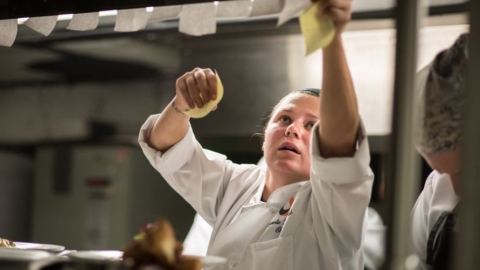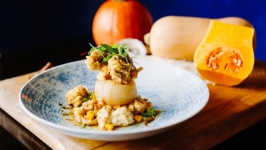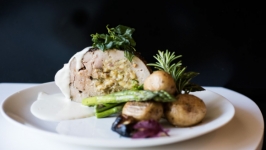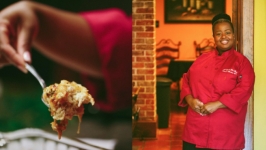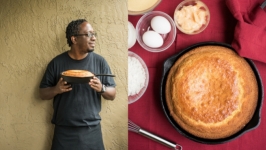Chef's Round Table: Women Running Professional Kitchens
Chef's Round Table is a back-of-the-house conversation series where we sit down with local chefs to get an inside look at the questions and conversations taking place in kitchens throughout Northeast Florida. Chefs change with each new round table, as do topics discussed. For the Women in Food Issue, we caught up with the following chefs:
Barbara Bredehoeft, Owner, Biscottis, BB’s and The Bakery
Erika Cline, Owner/Pastry Chef, Bleu Chocolat Cafe
Genie McNally, Chef/co-owner, The Floridian
DeeAnn Hobbs, Executive Chef, World Golf Village Renaissance
EDITOR’S NOTE:
Recent data from the U.S. Bureau of Labor Statistics show that about 20% of professional kitchens are run by females. To learn more about women in the region’s food service, we sat down with chefs and business owners overseeing local kitchens to discuss whether the culinary industry presents unique challenges for women to succeed and how to elevate more females to leadership roles. Criteria will change with each issue and chefs invited to participate will vary. Want to be included in the next discussion or have a chef you'd love to see featured? Drop us a line at editor@edibleneflorida.com.
***********
Tell us about your background in the hospitality and food service industry.
BARBARA: I went to school for engineering at the University of Tennessee, but finished with a degree in nutrition. I grew up with the guys who started Ruby Tuesday’s, so I started working with them after college and moved to Jacksonville to open a location here. I’ve been in the area ever since. I’ve had Biscottis for 25 years and BB’s for 19 years. I opened the bakery 11 years ago to supply pies, cakes and breads for the restaurants. Altogether there are 127 employees and 14 managers.
ERIKA: I went to culinary school in Detroit, where I grew up. I’ve worked in Nashville and Las Vegas and was the Pastry Chef at the Ponte Vedra Inn & Club for six years. I was living in Tortola, British Virgin Islands when Hurricane Irma and Maria came through and devastated the community, including my home and restaurant. I came back to Jacksonville to regroup and determine how to rebuild in the Caribbean. In the meantime, I am working on Bleu Chocolat Café, in a partnership with three other chefs. I call them my Sister Chefs.
GENIE: I’ve been in the restaurant industry since I was 15, and I have served, managed, catered and cooked. I studied English at UF and then decided I really wanted to work with food. I had a small catering company in St. Augustine and that led to finding a brick-and-mortar space to open a restaurant.
DEEANN: I grew up in Wisconsin and started at a mom-and-pop catering company there. My parents tried to convince me to go into nursing, but I didn’t want to. I wanted to go into food service. Before moving to the area in 1989, I worked in New Hampshire. I was the Banquet Chef at Sawgrass Marriott for 23 years before moving over to the Renaissance. I’ve been more on the hotel side than independent restaurant side.
What’s needed to get more women in leadership roles in the food industry?
ERIKA: I’m a James Beard alumni, so I have had some exposure to programs for women, which is really great. That opens the door for women of all colors, all ethnicities. I had the chance to cook at the James Beard House on three different occasions. Each time I brought a female student. I got excited for those women to have that experience. We need to reach back and pull those young ones in culinary school along with us. Without them, we can’t continue our story. When I was coming out of culinary school, there was always someone helping me – but it was never a woman. There were always men leading kitchens. My first mentor, a man, was at the Golden Mushroom, Chef Milos Cihelka. But my original mentor was my grandmother. And if it wasn’t for her, I wouldn’t be who I am today. And we don’t even see that so much anymore, influencing us with their cooking, their spices.
BARBARA: Culinary school graduates seem to watch so many cooking shows, and they want a title and all the glamour that goes with it. I say let’s get back to basics - how to use a knife, make sauces, set up mise en place.
DEEANN: They have to have the passion, a desire to make a dish better, to improve on what’s come before.
GENIE: The passion is something that is lacking, really, across genders. For females to excel, the same as for males, keep your head down, do the work, do it better than anyone else. Take an interest in everything and be willing to pursue what you want.
BARBARA: One thing that has really been wonderful for me is that I’m married to a man who truly supports me. He’s a veterinarian and he does the laundry, helps with the carpool. Having someone like that in your life is what really helps women get to where they need to be.
GENIE: When they don’t have to do the third shift at home.
BARBARA: Exactly, the third shift! Hopefully as we are raising sons to be more of an equal partner, that will also be beneficial to women. Raising a generation of boys who see that mom has a job, and dad has a job, and they are equally important. That helps.
GENIE: There’s an uprising of the matriarchy, bringing it back to our grandmothers. As a female head of the kitchen, you have to do more to earn the respect of the males.
What is your style of leadership in the kitchen and with your staff?
DEEANN: My style has changed through the years. When I was younger I was very aggressive because I felt I had to be that way so I would be taken seriously. Through the years I have mellowed a bit and taken another approach. When I started I was the only female in a kitchen with 12 other guys. So you just had to learn to communicate with them and become one of the guys. That was even one of the jokes – oh, she’s one of the guys! Because of that I was able to progress faster. If you don’t learn how to interact with the guys, you are dead in the water and won’t advance in your career. You find yourself along the way. Nowadays it seems like everyone is super sensitive, and I couldn’t be the aggressive person I was when I started.
ERIKA: Sometimes you act as a counselor, a therapist, a mother and you don’t necessarily want to do that with your employees. You just want to hand over the prep list and have the team get the work done. Currently, I have three women business partners, and we are all pretty much at the same level. We’re learning a different language to speak between the four of us to figure out how to have the restaurant run efficiently. Twenty years ago at a job, I was the only female in the kitchen. Even though I was the pastry chef,
every once in a while on a super busy night, I would help with sauté or other tasks in the kitchen. I would hold my own, because I could cook on the line.
GENIE: The kitchen is really the great equalizer. Can you perform? If so, you get the respect. So much is built around the military mentality – can we all fight this battle together, can I depend on you to have my back when it gets really hectic? Once you prove your chops, you are part of the crew. It is learning a different language. I’ve been in all-female kitchens and I now run a predominantly male team (primarily due to lack of female applicants).
ERIKA: But if you look at the culinary schools, they are filled with women.
BARBARA: So where are they going? There aren’t many around here.
GENIE: Were they in culinary school because they have a passion for cooking? Had they worked in restaurants before?
ERIKA: And when they jumped into the real world after going to school, and realized it was hard work, they don’t necessarily stay on.
GENIE: The real world’s hard.
DEEANN: It’s rough work, with long hours. That’s why you have to have a passion to stay in the kitchen. It wears you out really quick. You have to have a thick skin and not be too sensitive. You could be working on something all day and think it’s this great new dish. If someone comes along and doesn’t think much of the recipe, you have to just shake it off and see whether the criticism has any validity so you can make it better. You have to look past your ego and see what they are complaining about to analyze what they are saying and become better. That’s part of the growth needed to advance in the kitchen.
BARBARA: I haven’t had a lot of chefs over the years, and they have all been men. My current chef at Biscottis has been with me 16 years. I think women are better managers in the kitchen, we learned the value of collaboration and a support system. We’re a bit of the underdog, so we’ve had to figure out how to get someone to do something for you.
ERIKA: In my experience, I had to go in the kitchen with my tough skin on, jump into the action and not expect any help from the men. When I did get help, it was not necessarily a good thing. Then I would get the attitude of well I helped you, what are you going to do for me?
BARBARA: Well we all get that. That’s when you have a zinger ready give back!
GENIE: It depends on who I am speaking to, under what circumstances, to determine how to get what you need.
There have been a lot of stories surfacing about women dealing with sexual harassment and even assault in the workplace. Have any of you experienced that as you have advanced in your career?
ERIKA: I have been in uncomfortable situations. But then you say “Get off my ass,” and keep doing what you need to do.
BARBARA: You’ve got that right!
DEEANN: You didn’t go to Human Resources. You took care of things yourself.
BARBARA: You just have to be able to hold your own. You have to have a tart tongue and be able to give it back, to stand up to the comments.
DEEANN: I’ve had problems with male chauvinism, but if someone tried to do something to me, I just dealt with it directly.
GENIE: Is there sexism in the restaurant industry? Yes, absolutely. We as a culture are trying to progress past that, but you still have to be prepared to deal with it. Stories from the #MeToo movement aren’t surprising – this has been going on forever.
BARBARA: We can’t let that inhibit us, hold us back. Hold people accountable so you can get the pay and the title you deserve.
GENIE: In my experience, chauvinism is much more prevalent than sexual harassment.
DEEANN: Vendors come in and ask for the chef. Someone says, ‘the chef is over there,' and if I happen to be standing with a male counterpart, the vendor starts talking to him. I just stand there and wait until the vendor finds out I’m the decision maker. When I tell them to leave samples and I’ll get back to them, the vendor tries to back pedal. Other times the vendor will shake hands with everyone except me.
GENIE: Or at charity events, people approach the male you brought with you to help serve, assuming he is the chef. When I introduce my husband, people always assume he is the chef. They think that he runs the kitchen, and I am front of the house – exactly opposite of our situation. We can blame the stereotypes on the traditional European-style brigade system of culinary training which was male-dominated.
ERIKA: We need to see more women leaders to feel like we can be in charge. I’ve been able to discover a lot of women chefs around the world through social media.
Who has mentored you, or helped you navigate through your career?
ERIKA: My grandmother and my mom were instrumental in my career. I had my first business when I was 8 years old. I was selling cookies to my teachers and my mom recognized I had a talent for baking. She signed me up for cake decorating classes when I was 12. When you have a person that believes in you that much, that is a mentor.
DEEANN: I had an executive chef when I worked in banquets who really helped me when my kids were younger. He let me work the hours I needed to have a family, and he didn’t hold it against me. His management approach influenced my style over the years and made me a little more sensitive to what my team needs.
GENIE: My mother and grandmother were absolutely my biggest mentors. When I first started cooking, it was for a woman-owned catering company, with an all-female kitchen. The owner led with compassion and she was funny, engaged and whip-smart. That was enlightening and empowering. She definitely shaped how I approached running a business, and I carry her influence with me in the kitchen. Women can bring each other up. You reach back to the ones just starting out in the industry.
ERIKA: If we don’t, what is the next generation going to do? Years ago, I was included in Ebony Magazine’s Top 25 African-American chefs in the US. That was an eye-opening experience for me, to see these other chefs in positions of power. The camaraderie that came out of that opportunity was really valuable. I started Culinary Women USA, a website showcasing minority chefs throughout the country, and that was helpful for younger people just starting out in the industry.
DEEANN: I went to a hotel chef conference in Atlanta, thinking I would network and learn something. I walked in and the majority of the attendees were white men. I could count on one hand the number of minority chefs there, and could count on two hands the number of women. It was eye-opening!
Any regrets about going into the food business?
BARBARA: Oh no, I love it! It doesn’t mean you are going to make a ton of money. People think the restaurant business is so glamorous! I feel like saying I make a living just like you do. And it’s hard work.
GENIE: The food business is pretty much the only job and career I have ever known, and I love what I do.
DEEANN: I’m not sure what else I would do if I didn’t work in this industry.
ERIKA: Everybody has to eat, and you’ll always have a job. And I love that! I crave that feeling of being able to feed somebody, watch their reaction when they taste one of our dishes. That’s the best part of being a chef, giving people that feeling of comfort.


